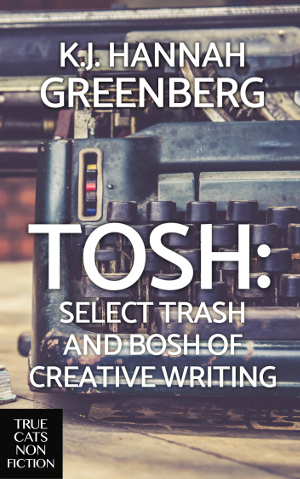KJ Hannah Greenberg
Tosh: Select Trash and Bosh of Creative Writing
 |
Tosh: Select Trash and Bosh of Creative Writing
Crooked Cat Books. France.
Dec. 2017. Order here.
Our accounts about fashioning texts might begin with remonstrations about existence and only thereafter morph into duets between memories and realizations. We, as a society, have become accustomed to shaping words for reasons of profit, of promoting ideas, or of getting our jollies. Given the prevalence of eBooks, writing has again become a popular pastime.
Nonetheless, no matter the extent to which or the frequency with which we romanticize our assembling of pages, there remains much about this act that is gritty. First of all, our practices, when uniformed, fall short of guaranteeing that we have created actual literature. Second, our habit of utilizing unnecessary prescriptions makes for much weak tea. Third, even our well composed treaties are often not commercially lucrative, while our balderdash results in flashes of fame. Today, there exist so many factors that influence the relative success of a printed product that, even when engaging in new strategies, we're not guaranteed good outcomes.
As such, it behooves us writers, whether we are inspired by glassblowers, by health food store clerks, or by glorified academics, to yield a little and to exert a lot. Except for the singular moments when our intellectual epiphanies sound like rain over the Okavango River or create visions akin to those of the swarms of butterflies in the Sahyādri, we are advised to be humble regarding our understandings of the publishing industry. Simply, if we get a project to market, we've accomplished something; if not, it benefits us to think about reframing our pitch.
Our attempts, both ordinary and irregular, to refine/redefine ourselves, our writing, and our relationship to our writing, like U-boat maneuvers that force submerged ships through many repetitions of gyrations, might result in meeting our ends or might only churn water. In balance, without such twists and rolls, it's unlikely that we'll ever be able to proclaim, "yup, got one!"
CONTENTS:
Preface: Creative Writing's Trash and Bosh
Introduction: Knock-Knock
1. Writing Attitudes
1.1 Pleasure from Dangerous Reptiles Slithering under Trailer Homes
1.2 Work Drug
1.3 Working Stiff
1.4 A Manifesto of Sorts
1.5 Keeping Up
1.6 Using Emotional Appeals to Gain Employment as a Writer
1.7 Limits
1.8 Nonsenses
1.9 Junk vs. Joy
1.10 The Need for Staid Midlife Moms to Write Bizarro Texts
1.11 Realizing I've become a Grandma Writer
1.12 Proportionate Memories
2. Writing Absurdities
2.1 Eating Fugu
2.2 Idiots and Their Friends
2.3 (Not Quite) Burgeoning
2.4 Variations, Maybe Themes
2.5 Writing While Being a Crazed Mama
2.6 Of Hedgehogs, Komodo Dragons, and Other Anthropomorphized Friends
2.7 Developing into a Writer
2.8 Fits and Starts
2.9 Writing for Dollars
2.10 The Business World as a Tourist Destination
2.11 A Few Clicks to an Internet Life
2.12 I Wanna be a Model
3. Writing Experiences
3.1 Jewish Writing
3.2 First Blog
3.3 My First International Bloggers' Conference
3.4 A Select, Personal History of Blogging
3.5 Independent Blog Writing and Book Promotions
3.6 Thrill Rides versus Social Status
3.7 Expansion
3.8 A New Distribution of Ideas
3.9 Adrenal Fatigue
3.10 You Only Live Twice
3.11 As Subtle as a Skunk in Heat
4. Writing Epiphanies
4.1 Truth vs. Imagination
4.2 Perspective
4.3 Not Quite a Five Year Plan
4.4 Context-Sensitive and Context-Free Language
4.5 Precipice
4.6 Midlife Madness
4.7 Pluff Mud
4.8 The Regulation of Sanity and of Other Forms of Order
4.9 Animated Writing
4.10 Mindful Accomplishing
4.11 The Problem with Employing Deus Ex Machina in Hard Science SciFi
5. Writing Wisdoms
5.1 Growing Up
5.2 Why Mothers Flee Quickly
5.3 And Then Came Mom
5.4 Work Less, Work Smarter
5.5 Overcoming Risk Aversion
5.6 Under the Influence of Children: Offspring's Impact on the Creative Process
5.7 Gymnastics and Juggling
5.8 Desert Writer, Poet
5.9 I Think You Can, I Think You Can
5.10 From the Animals in Gan Eden to Shakespeare's Rose: The Naming of Self
5.11 Oldsters' Cri de Cœurs
5.12 Gratitude for Writing
Conclusion: Imperfect Continuity
Credits
Acknowledgements
About the Author